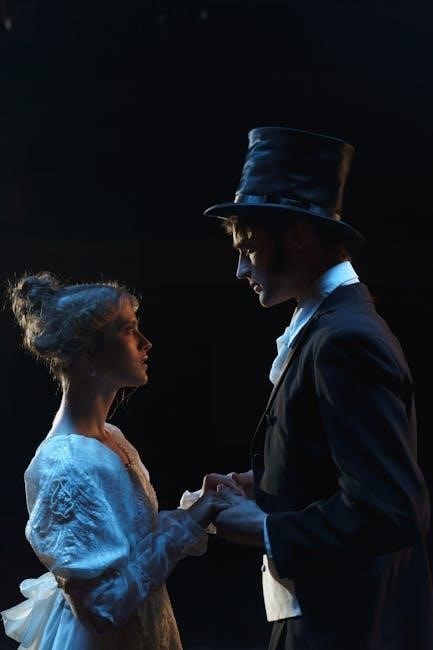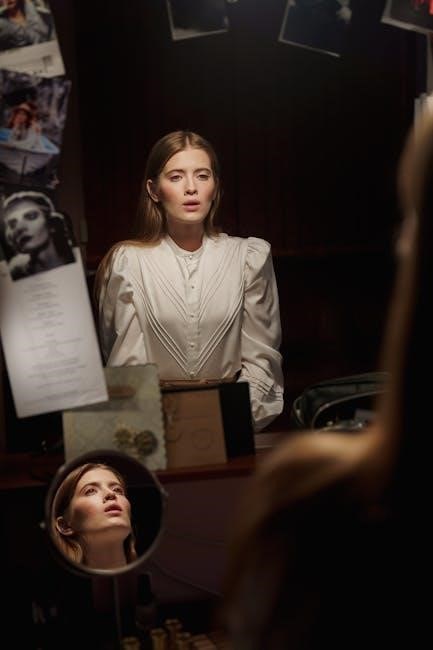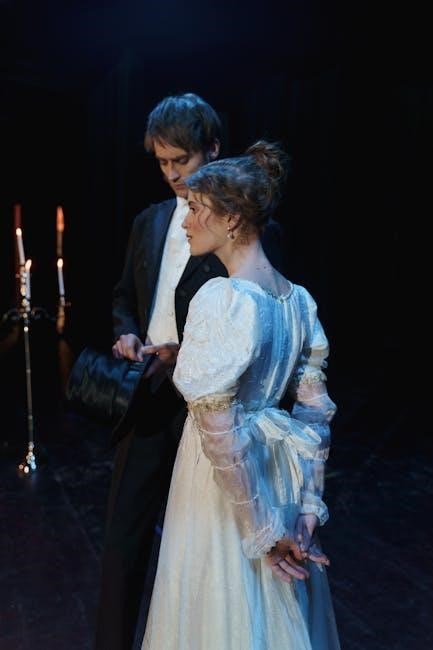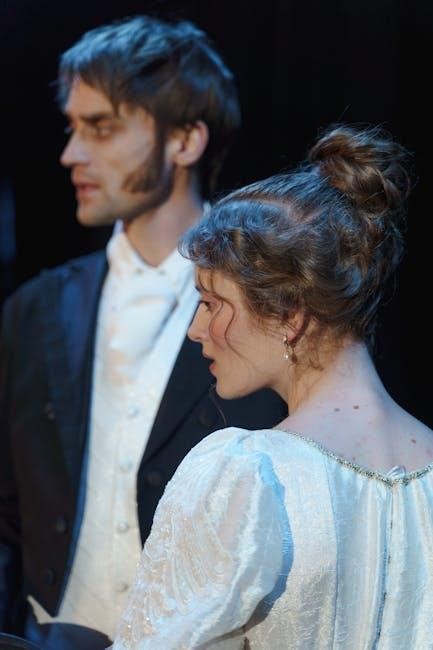Act 1 sets the stage in Verona, introducing the bitter feud between Montagues and Capulets. It establishes key characters, including Romeo and Juliet, and explores themes of love and conflict.
1.1. Historical Context and Setting
Romeo and Juliet is set in Verona, Italy, during the Renaissance, a time of cultural flourishing but also societal tensions. The play opens in a violent world where family feuds, like the one between the Montagues and Capulets, dominate. Verona’s streets are portrayed as dangerous, with servants and nobles alike engaging in conflicts. The historical context highlights a rigid social hierarchy, with families vying for power and reputation. The setting establishes a backdrop of animosity and unrest, which shapes the characters’ actions. Key locations, such as the Capulet’s ball and Juliet’s balcony, become symbolic spaces for forbidden love and secret encounters. This setting underscores the tragic inevitability of the story, rooted in a world where loyalty to family often surpasses personal desire.
1.2. Overview of the Feuding Families (Montagues and Capulets)
The Montagues and Capulets are two prominent families in Verona, embroiled in a bitter, long-standing feud. Their rivalry dominates the city’s social landscape, fueled by pride and a desire for prestige. The Montagues, led by Lord and Lady Montague, are portrayed as noble yet often passive, while the Capulets, headed by Lord and Lady Capulet, are depicted as wealthy and influential. Both families are respected in Verona, but their hatred for each other escalates into public violence, involving their servants and kinsmen. This animosity creates a volatile atmosphere, shaping the lives of their children, Romeo and Juliet, who become entangled in a doomed love affair. The families’ conflict sets the stage for tragedy, as loyalty to family overshadows personal happiness.

Key Characters Introduced in Act 1
Act 1 introduces Romeo, a passionate Montague, Juliet, the Capulets’ daughter, the wise Nurse, and Benvolio, Romeo’s loyal friend, shaping the play’s emotional core.
2.1. Lord and Lady Capulet: Their Roles and Expectations
Lord and Lady Capulet are central figures in Verona’s high society, deeply embroiled in the feud with the Montagues. They are portrayed as authoritative and traditional, valuing family honor and social standing above all else. Lady Capulet, though less prominent than her husband, plays a crucial role in Juliet’s upbringing, emphasizing obedience and marital duty. Lord Capulet is demanding and rigid, expecting unwavering loyalty from his family. Their primary expectation for Juliet is marriage to Paris, a union that secures their family’s prestige. They view Juliet’s compliance as a duty, reflecting the societal norms of the time. Their strict adherence to tradition creates tension, particularly as Juliet begins to assert her own desires. This dynamic sets the stage for the inevitable conflict between parental expectations and personal choice.
2.2. Juliet: Her Personality and Relationship with the Nurse
Juliet, at just 13, is portrayed as naive, innocent, and emotionally vulnerable. She is deeply influenced by her family and societal expectations, particularly in her relationship with her parents. The Nurse, who has cared for Juliet since childhood, serves as her confidante and provides maternal affection. Their bond is warm and trusting, with the Nurse offering practical advice and emotional support. Juliet’s interactions with the Nurse reveal her youthful curiosity and desire for guidance. The Nurse’s wisdom and experience contrast with Juliet’s innocence, highlighting her sheltered upbringing. This relationship underscores Juliet’s dependence on others and her limited understanding of the world beyond her family. Their dynamic is a key element in shaping Juliet’s early character development and emotional journey in Act 1;
2.3. Benvolio: His Role as Romeo’s Confidant
Benvolio, a close cousin of Romeo, serves as his trusted friend and voice of reason. He is calm, rational, and peacemaking, often trying to mediate conflicts. In Act 1, Benvolio attempts to console Romeo over his unrequited love for Rosaline, offering wise advice and encouraging him to attend the Capulet ball. His loyalty and understanding make him Romeo’s confidant, providing emotional support and practical guidance. Benvolio’s level-headed nature contrasts with Romeo’s impulsive behavior, highlighting his role as a stabilizing influence. Through their interactions, Benvolio demonstrates his care for Romeo and his desire to see him happy, making him a vital character in Romeo’s early emotional journey.
2.4. Romeo: His Character Traits and Early Emotional State
Romeo, a young Montague, is portrayed as impulsive, passionate, and deeply emotional in Act 1. His early infatuation with Rosaline reveals his tendency to idealize love, showcasing his romantic and sensitive nature. Romeo’s emotional state is marked by melancholy and despair, as he is heartbroken over Rosaline’s rejection. His soliloquies highlight his introspective and poetic side, emphasizing his depth of feeling. Despite his sorrow, Romeo’s attendance at the Capulet ball demonstrates his willingness to take risks for love, foreshadowing his later actions. His emotions shift rapidly, from despair to hope, indicating his volatile and passionate personality. This emotional complexity makes Romeo a relatable and dynamic character, setting the stage for his transformative journey in the play.

Major Themes in Act 1
Act 1 introduces themes of love vs. hate, fate, and conflict. The violent feud between families contrasts with Romeo’s romantic ideals, setting the stage for tragic events.
3.1. The Theme of Conflict and Violence
The theme of conflict and violence is prevalent in Act 1, evident through the brawl between Montague and Capulet servants. Their animosity escalates tensions, highlighting the deep-rooted hatred between the families. The servants’ aggressive behavior, such as Sampson biting his thumb, symbolizes the petty yet explosive nature of their rivalry. Benvolio’s attempt to mediate showcases the futility of peace amidst such entrenched hostility. This violence sets the tone for the tragic events that will unfold. Shakespeare uses these scenes to emphasize how senseless conflicts can dominate human behavior, overshadowing the potential for harmony and understanding.
3.2. The Influence of the Nurse on Juliet
The Nurse plays a pivotal role in Juliet’s life, serving as her closest confidante and surrogate mother figure. With a warm, affectionate, and humorous demeanor, the Nurse provides emotional support and practical advice, contrasting sharply with Juliet’s formal relationship with her parents. Her long-winded stories and folksy wisdom reveal a deep affection for Juliet, whom she has nurtured since infancy. The Nurse’s influence is evident in Juliet’s trust and reliance on her, particularly when discussing marriage and her future. However, the Nurse’s simple, unsophisticated perspective often leads to advice that lacks the strategic insight Juliet needs, highlighting the limitations of her guidance despite her good intentions and loyalty. Her presence underscores Juliet’s isolation within her family and society.

Significant Scenes in Act 1
Act 1 features the violent confrontation between Montague and Capulet servants, highlighting the deep feud. The Capulet ball is introduced, setting the stage for Juliet’s character and the impending conflict.
4.1. The Confrontation Between Servants of the Montagues and Capulets
The opening scene of Act 1 showcases a heated confrontation between servants of the Montagues and Capulets. Sampson and Gregory, servants of the Capulets, engage in a verbal dispute with Abram and Balthasar, servants of the Montagues. Sampson bites his thumb, a disrespectful gesture, provoking the Montagues. Benvolio, a Montague, attempts to calm the situation, while Tybalt, a Capulet, arrives and escalates tensions. The clash highlights the deep-seated hatred between the families. Swords are drawn, and the skirmish grows until the Prince of Verona intervenes, warning both families of severe consequences if the feud continues. This scene establishes the violent tone and introduces the central conflict driving the play.
4.2. The Capulet’s Ball and Its Importance
The Capulet’s ball is a pivotal event in Act 1, primarily serving as the setting where Romeo and Juliet first meet. Lord and Lady Capulet host the gathering to strengthen their social standing and secure a advantageous marriage for Juliet with Paris. Unbeknownst to them, Romeo, disguised as a guest, attends the ball, driven by his infatuation with Rosaline. The ball’s significance lies in its role as the catalyst for the lovers’ fateful encounter. The grandeur and formality of the event contrast with the private, emotional meeting between Romeo and Juliet, highlighting the societal constraints surrounding their love. This scene marks the beginning of the star-crossed lovers’ journey, setting the stage for the tragic events that follow.

Romeo and Juliet’s First Meeting
Romeo and Juliet meet at the Capulet’s ball, their eyes locking in a moment of profound connection. This encounter sparks an undeniable attraction, despite their families’ feud.
5.1. The Balcony Scene: A Symbol of Forbidden Love
The balcony scene captures the essence of Romeo and Juliet’s forbidden love. Juliet stands on her balcony, expressing her feelings for Romeo, who listens unseen below. Their exchange is poetic and passionate, with Romeo revealing himself and proposing marriage. This moment symbolizes the strength of their love despite the families’ hatred. The scene is rich in romantic imagery, emphasizing the conflict between their emotions and societal obstacles. It highlights Juliet’s innocence and Romeo’s ardent devotion, setting the stage for the tragic events that follow. The balcony becomes a symbol of their love’s isolation and the societal barriers they must overcome.

The Ending of Act 1
Act 1 concludes with Romeo resolving to attend the Capulet’s ball, driven by his infatuation with Rosaline and Benvolio’s encouragement, setting the stage for fate.
6.1. Romeo’s Decision to Defy His Family for Love
Romeo’s decision to attend the Capulet’s ball, despite the familial feud, marks a pivotal moment in Act 1. Driven by his infatuation with Rosaline and urged by Benvolio, Romeo resolves to sneak into the event. This bold choice reflects his impulsive and romantic nature, as well as his belief in fate guiding his actions. The decision sets the stage for his encounter with Juliet, igniting a chain of events that will challenge the longstanding rivalry between their families. Romeo’s willingness to defy his family for love underscores the central theme of passion overcoming societal barriers, while also highlighting the tragic consequences of impulsive behavior.

Leave a Reply
You must be logged in to post a comment.